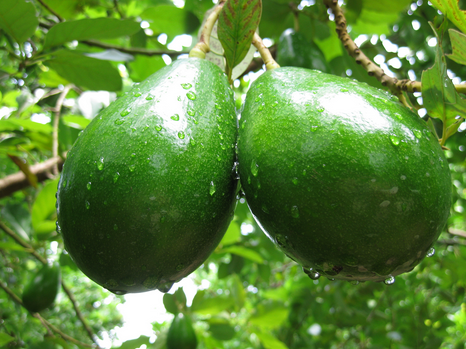Also known as an alligator pear or butter fruit, the versatile avocado is the only fruit that provides a substantial amount of healthy monounsaturated fatty acids (MUFA). Avocados are a naturally nutrient-dense food and contain nearly 20 vitamins and minerals. Avocados contain a wealth of nutrients, sometimes dismissed by health-conscious consumers because of its high fat content, the avocado fruit is a worthwhile addition to any diet because its fats consist largely of heart-healthy monounsaturated fatty acids, or MUFAs. But that’s just the beginning of the avocado’s nutritional bounty, which also includes rich amounts of folate, vitamin E, magnesium and potassium. The fruit also contains high levels of soluble fiber, which helps to lower bad cholesterol.
This fruit takes the top spot as the best fruit that will guarantee a smooth and growing skin. Most ladies will agree with me due to the effective use of facial mask, skin oil and body lotion/moisturizer with avocado extracts. Avocado encompasses essential vitamins such as A, C and E that are significance in moisturizing the skin. Fundamental minerals such as potassium, magnesium and folic acid all ensure a healthy skin. Taking avocado fruit for breakfast, especial as spread on bread or anytime during the day when hungry is so nice. You can also slice it on your rice, noodles or snacks; it’s no nourishing and delicious. Give it a try.
Nutritional Composition of Avocado
Hass is the most widely commercially cultivated avocado in the world. In an article written for “Critical Reviews in Food Science and Nutrition,” nutrition research consultant Mark L. Dreher said one-half of a Hass avocado — a typical serving — constitutes a food rich in nutrients and phytochemicals, which are plant-based compounds found to have multiple health benefits. Half of a Hass avocado contains 4.6 grams of dietary fiber, 19.5 milligrams of magnesium, 345 milligrams of potassium and 5.5 grams of sodium. Its vitamin makeup includes 43 micrograms of vitamin A, 6 milligrams of vitamin C, 1.3 milligrams of vitamin E, 14 micrograms of vitamin K1, 60 milligrams of folate and significant amounts of other B-complex vitamins, including B-12, niacin and choline. Its primary phytochemicals include lutein, zeaxanthin, cryptoxanthin and phytosterols. MUFAs account for 72 percent of the fatty acids in avocado oil, polyunsaturated fatty acids make up 13 percent and saturated fatty acids make up the remaining 15 percent.


Reduces Bad Cholesterol
Elevated levels of low-density lipoprotein, the so-called bad cholesterol, are widely associated with an increased risk of cardiovascular disease. A researcher at Saudi Arabia’s King Saud University College of Pharmacy conducted an animal study to evaluate the efficacy of avocado fruit pulp in lowering LDL levels, a treatment modality used widely in African folk medicine. In an article published in the “African Journal of Pharmacy and Pharmacology,” the researcher reported that his study confirms avocado’s effectiveness in lowering bad cholesterol. He said that phytochemicals in avocado demonstrate potent cholesterol-lowering and antioxidant properties.
Slows Cancer Cell Spread
To better understand the mechanisms involved in avocado’s reputed ability to inhibit the proliferation of cancer cells, a team of Ohio State University researchers conducted in-vitro tests of avocado extract against malignant and premalignant oral cancer cells. Reporting their findings in the June 2011 issue of “Biochemical and Biophysical Research Communications,” they said they were able to isolate two aliphatic acetogenins they believe to be responsible for avocado’s anticancer properties. Aliphatic acetogenins are organic compounds that target adenosine triphosphate, or ATP, an energy-transporting substance that cells need to grow and spread.
Promotes Healthy Skin

In addition to their high levels of skin-healthy MUFAs, avocados contain a fair amount of biotin, a B-complex vitamin that helps keep skin hydrated from the inside out, according to dermatologist Ava Shamban, author of “Heal Your Skin.” In explaining the skin-beneficial properties of MUFAs, Shamban points out that these fatty acids promote the formation of ceramides, which are lipid molecules that help to plump up skin and keep it healthy. The dermatologist includes avocado among her select group of “superskin foods.”
NEXT WEEK: IMPRESSIVE BENEFITS OF AVOCADO (2)
To be continued next week… Don’t forget to always shoot a comment, like and follow me on all social media platforms.

Journalist <> Blogger <> Publishing <> Brand Consultants <> Film/Documentary Production
Phone: +234-807-202-2024; E-mail: [email protected]; Instagram: evertess2010; LinkedIn: Theresa Moses; Twitter: @moses_theresa; Facebook: Theresa Moses







